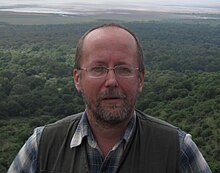Andrey Korotayev
Andrey Korotayev (bahasa Rusia: Андре́й Вита́льевич Корота́ев), lahir tahun 1961 di Moskow, adalah seorang sejarawan dan ekonom, dengan kontribusi penting untuk teori dunia sistem dan model matematika dari macrodynamics sosial dan ekonomi.[1] Nya teori pembangunan sosial sangat populer juga.[2] Ia mulai memanfaatkan metode kuantitatif untuk menjawab pertanyaan yang melibatkan dampak ekonomi pada peristiwa historis spesifik terhadap suatu masyarakat.[3] Sebuah kontribusi khusus dibuat oleh dia di bidang ini oleh deteksi tren utama dari pengembangan budaya Yaman melalui penerapan metode kuantitatif untuk analisis sumber epigraphic. Selain itu, Korotayev memberikan kontribusi penting untuk mempelajari asal-usul Islam.[4] Kepentingan utama beliau dalam strategi keamanan negara dan demokrasi di negara-negara berkembang.

| Antropologi |
|---|
 |
| Bidang |
| Sub bidang |
| Metode dan kerangka kerja |
| Konsep utama |
| Artikel terkait |
Karya-karyanya diterbitkan di AS, Inggris, Rusia[5], Perancis[6], Jerman, Austria, Swedia, Belgia, Spanyol, Italia[7], Hungaria[8], Republik Ceko[9], Australia[10], Cina, Jepang[11], Norwegia, Turki[12], Mesir [13], Yaman, Ukraina dan Selandia Baru[14].
Referensi
- ^ Korotayev A., Malkov A., Khaltourina D. Introduction to Social Macrodynamics. Secular Cycles and Millennial Trends. Moscow: URSS, 2006.
- ^ World Religions and Social Evolution of the Old World Oikumene Civilizations: A Cross-cultural Perspective. N.Y.: Edwin Mellen Press, 2004.
- ^ Ancient Yemen. Oxford: Oxford University Press, 1995. ISBN 0-19-922237-1; Pre-Islamic Yemen. Wiesbaden: Harrassowitz Verlag, 1996. ISBN 3-447-03679-6;Regions Based on Social Structure: A Reconsideration // Current Anthropology 41/5 (2000): 668–690; World Religions and Social Evolution of the Old World Oikumene Civilizations: A Cross-cultural Perspective. New York: Edwin Mellen Press, 2004.
- ^ Origins of Islam: Political-Anthropological and Environmental Context. Acta Orientalia Academiae Scientiarum Hungaricae. 53/3–4 (1999): 243–276
- ^ Introduction to Social Macrodynamics. Compact Macromodels of the World System Growth. Moscow: URSS, 2006.
- ^ Variabilité des relations sociales chez les primates humains et non humains: à la recherche d'un paradigme general // Primatologie 3 (2000): 319–363.
- ^ The Sabaean Community (SB'; 'SB'N) in the Political Structure of the Middle Sabaean Cultural Area // Orientalia 63 (1994): 68-83
- ^ Origins of Islam: Political-Anthropological and Environmental Context. Acta Orientalia Academiae Scientiarum Hungaricae. 53/3–4 (1999): 243–276
- ^ Was the "Traditional Sabaean Dynasty" of the 1st Century A.D. Really Sabaean? Archiv Orientalni 62 (1994): 27-31.
- ^ The Earliest Sabaeans in the Jawf: A Reconsideration // Arabian Archaeology and Epigraphy 9 (1998): 118-124.
- ^ Social Macrodynamics: Mathematical Models of the World System Development (丘雄二/訳「社会のマイクロダイナミクス:世界システムの成長とコンパクト・マクロモデル」) // The Journal of the Infosocionomics Society (情報社会学会誌). 2007. Vol. 2. Issue 1
- ^ Sociological Theory of Abd al-Rahman ibn Khaldun (1332–1406) as a Methodological Basis for the Mathematical Modeling of Political-Demographic Dynamics of Medieval Еgypt // 38. ICANAS / Ed. by Zeki Dilek. Ankara: ICANAS, 2007.
- ^ الماكروديناميكا الاجتماعية - النمذجة الرياضية لتطوّر المنظومة العالمية قبل سبعينيّات القرن الماضي // Bulletin of the Faculty of Arts of the Cairo University مجلة كلية الآداب لجامعة القاهرة. 2008. Vol. 68. Pt. 2: 148–181.
- ^ Korotayev A. V. Compact Mathematical Models of the World System Development and Their Applicability to the Development of Local Solutions in Third World Countries // Systemic Development: Local Solutions in a Global Environment / Ed. by J. Sheffield and K. Fielden. Auckland: ISCE Publishing, 2007. P. 101−114.
Bibliografi
- Ancient Yemen (Oxford University Press, 1995).
- World Religions and Social Evolution of the Old World Oikumene Civilizations: A Cross-cultural Perspective (Edwin Mellen Press, 2004).
- Korotayev A., Malkov A., Khaltourina D. Introduction to Social Macrodynamics: Compact Macromodels of the World System Growth.. Moscow: URSS, 2006. ISBN 5-484-00414-4
- Korotayev, Andrey V., & Tsirel, Sergey V.(2010). A Spectral Analysis of World GDP Dynamics: Kondratieff Waves, Kuznets Swings, Juglar and Kitchin Cycles in Global Economic Development, and the 2008–2009 Economic Crisis. Structure and Dynamics. Vol.4. #1. P.3-57.
- Egyptian Revolution: A Demographic Structural Analysis. Entelequia. Revista Interdisciplinar 13 (2011): 139-165.
- تاريخ اليمن الاجتماعي. موسكو, 2006.
- مقدّمة الماكروديناميكا الاجتماعية: النمذجة الرياضية لتطوّر المنظومة العالمية قبل سبعينيّات القرن الماضي "مجلة كلية الآداب لجامعة القاهرة"٬ مجلد 68 ٬ سنة 2008 ٬ الجزء الثاني ٬ صفحات 148–181 .
- انفجار فقاعة أسعار الذهب في ابريل أو مايو 2011